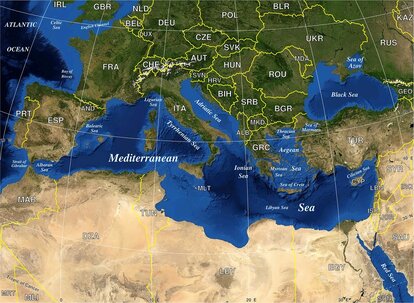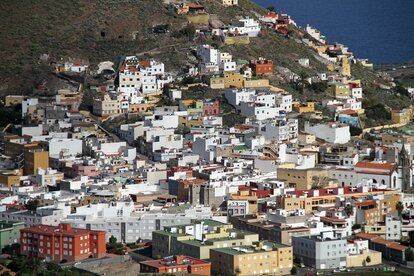Security
The 5+5 Initiative, a bridge between the two shores of the Mediterranean

The Western Mediterranean Forum, better known internationally as the 5+5 Initiative, is one of the longest-standing frameworks for cooperation between the nations of the Mediterranean basin and its vicinity.
It is composed of two core states located on two different continents, separated by only a few kilometers, but linked for centuries by trade and commercial relations of all kinds. In geopolitical terms, five nations belong to the African Union, four of which border the Mare Nostrum, namely Algeria, Libya, Morocco and Tunisia, to which is added Mauritania, which is bordered by the Atlantic.
The other group is also made up of five countries, four of which are located in the southern European Mediterranean - Spain, France, Italy, and Malta - with the inclusion of Portugal, which is located in the Atlantic. All of them are members of the European Union (EU) and the recognised southern flank of the Atlantic Alliance, with the sole exception of Malta, which does not belong to the North Atlantic Treaty Organisation (NATO).
In essence, the 5+5 Initiative is an informal forum that came into being in 1990 at a meeting of foreign ministers in Rome to initiate a process of political dialogue and cooperation. The international policy-makers of the ten states were already committed more than three decades ago to fostering mutual understanding, promoting more effective management of their respective resources, strengthening peaceful relations, and, in short, strengthening ties of all kinds between the two sides of the Mediterranean.
Over the years, the Forum has gradually extended its sphere of activities to different areas of common interest. The Interior and Transport Ministerial Conferences were launched in 1995. This was followed by conferences on Migration (2002), Defence (2004), Tourism (2006) and Higher Education, Research and Innovation (2009).
In the following decade, new niches of shared interest emerged and new specialised forums were born, such as Environment and Renewable Energies (2010), Agriculture and Food Security (2013), Economy (2013), Water (2015). The most recently activated ones have been Finance and Culture, which came into being in 2017.

Equality, mutual respect and voluntary participation
Of all the coordination groups in place, the most active, without a doubt, is the Defence group. Called the "5+5 Defence Initiative", it arose as a result of a declaration of intent proposed by Spain and agreed in December 2004 by the ten defence ministers.
The content of the document is in line with a minimum and very open basis, and seeks to strengthen mutual understanding and trust between political bodies and senior military commanders, with a view to "developing multilateral cooperation aimed at promoting security in the Western Mediterranean".
Among the keys to the continuity of the "5+5 Defence Initiative" over time is the relationship of equality that prevails on the basis of a spirit of the utmost respect. Also contributing to its permanence is the flexibility and pragmatism with which each defence ministry acquires a greater or lesser degree of commitment, the voluntary nature of participating or not in any of the activities programmed by mutual agreement, and the lack of permanent structures.
However, one of the ten countries is responsible for chairing the Steering Committee on a rotating basis. During a calendar year, it becomes responsible for developing the annual action plan and organising the exercises, seminars, conferences, meetings, courses, activities and, of course, the ministerial meetings that have been decided to convene.
Spain has just taken over the presidency for 2024, the 20th anniversary of the launch of the sectoral defence forum. It took over from Portugal, which ended its 2023 mandate after the ministerial meeting held in Lisbon in mid-December last year.

Gran Canarias, Canary Islands, Spain.
© PixabaySeeking interoperability
The Spanish Defence Ministry has scheduled a total of 12 activities on national soil. The closest in time is the first meeting of the Steering Committee, which, made up of national delegations, will hold its inaugural session on 5 March. Meetings of the Chiefs of Defence Staff and other technical committees are also planned. The Spanish presidency will culminate at the end of November with a conclave of defence chiefs.
The ten countries are particularly interested in improving their interoperability in different tactical, operational and training scenarios. Among the main activities that Spain has proposed and which have been approved is a major joint maritime rescue and rescue exercise, which will take place in the waters of the Canary Islands archipelago.
Also planned is an exercise to support civilian authorities in disaster situations, another on maritime security, and courses and seminars on cyber-defence, demining and the implementation of the gender perspective in operations, as well as sharing experiences in the health protection of military forces in operations.
The 5+5 Initiative went through a ten-year period of lethargy shortly after its establishment. This occurred in the wake of the 1991 Gulf War and its direct and indirect consequences, such as the so-called Arab Spring. Fortunately, the dialogue was resumed in January 2001, when the foreign ministers met again in Lisbon and gave new impetus to the process.
As we enter the first quarter of the 21st century, the desire of all 5+5 countries is to join forces and build on joint activities to turn the Western Mediterranean into a privileged space of trust and security.
